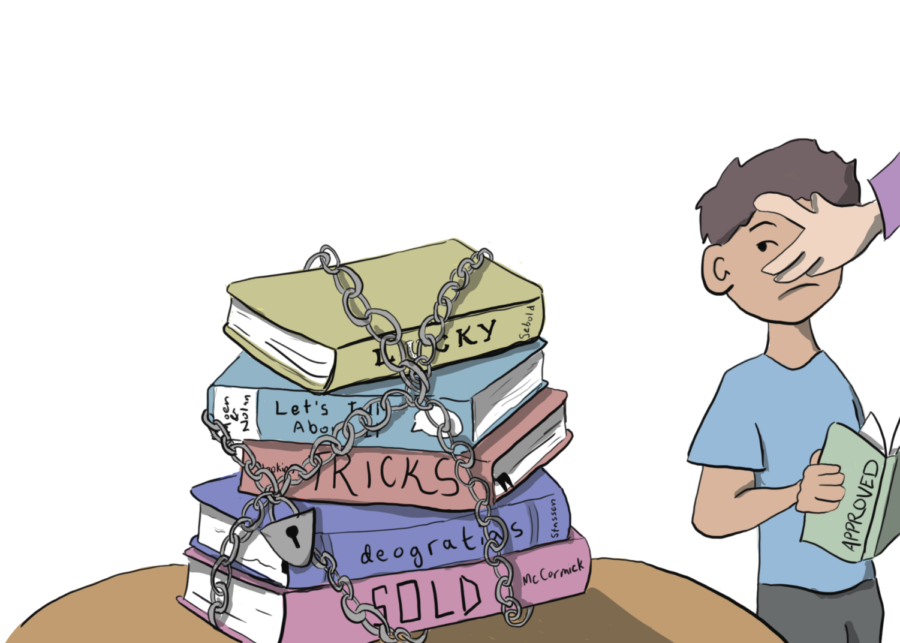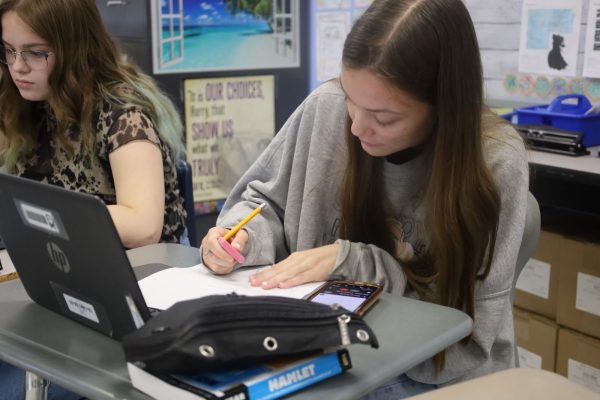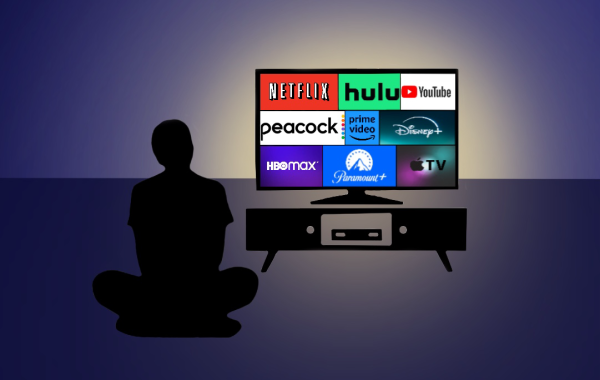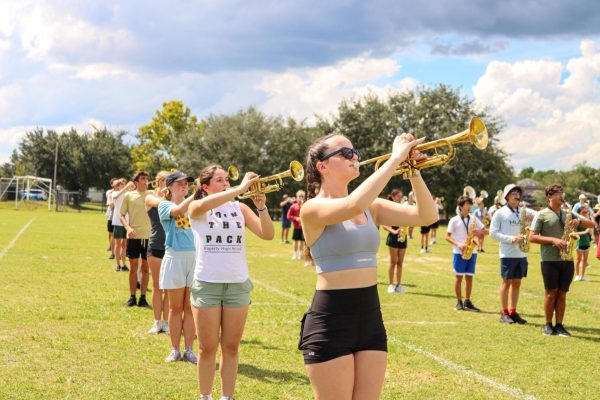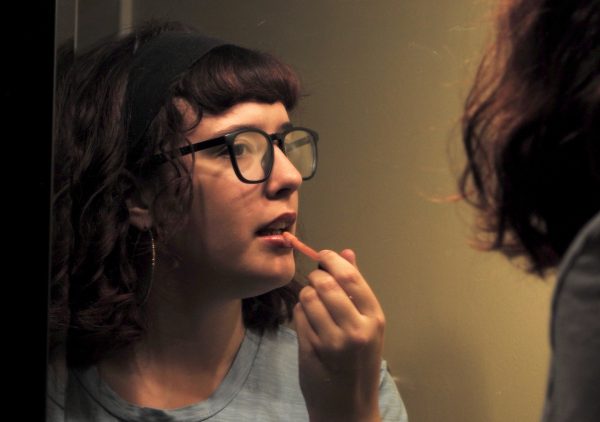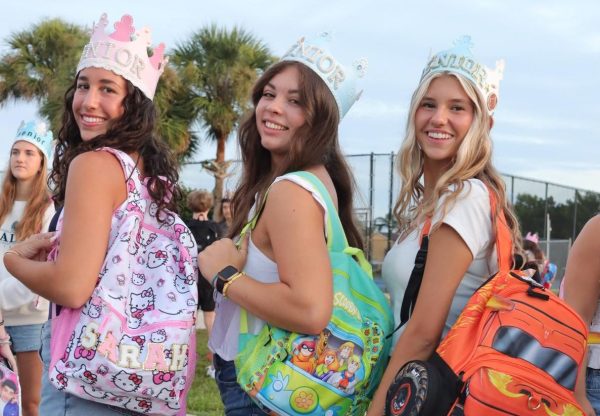House Bill 1467 sparks controversy over “book bans”
The Left calls it a “book ban,” the Right calls it “parental rights.” But whatever its name, HB 1467 pulls books from shelves that are deemed inappropriate.
photo by Josephine Lim
In Seminole County, eight books have been pulled from shelves for themes of rape, sexual slavery and masturbation. Two are removed indefinitely while the rest are under review, awaiting the district office’s permission to set up parental consent areas in the library.
In March 2022, Gov. Ron DeSantis signed Florida House Bill 1467 into law, requiring school districts to be “transparent in the selection of instructional materials.” For Moms of Liberty Seminole Chapter Chair Jessica Tillmann, the law prevents pornographic material from falling into children’s hands.
“I have four children ages 2-14. This law ensures [that] I can trust inappropriate books will not be in the hands of my children,” Tillmann said.
But for senior Devon Worthy, this law is just another way of disguising book banning, discriminating against minorities and LGBT students like him.
“I think people are going to get a lot more closed-minded and a lot more bigoted towards certain issues, because if you’re not exposed to it and you don’t have the resources to learn about it, then you’re going to automatically fear it,” Worthy said.
Although the law itself does not specifically prohibit certain books, it gives districts the power to pull books from shelves if they deem it inappropriate. The definition of “inappropriate” is where lines get blurred.
In Indian River County schools, “The Handmaid’s Tale” by Margeret Atwood was banned, along with other popular novels such as “The Kite Runner” by Khaled Hosseini, “A Court of Thorns and Roses” by Sarah J. Maas and “The Perks of Being a Wallflower” by Stephen Chbosky. Ironically, Worthy’s AP English Literature and Composition class just read “The Handmaid’s Tale” last quarter.
“I think [The Handmaid’s Tale] is important because it brings up a lot of modern political issues that people kind of sweep under the rug a lot,” Worthy said, “Like women’s rights or bodily autonomy, which I think are important issues.”
Across Florida, books featuring gay or minority characters like “Gender Queer” and “This Book Is Gay” have been pulled from school libraries. Flagler schools even banned “The Hate U Give” by Angie Thomas, a young adult novel about the shooting of an unarmed black man by a white police officer. Identifying as queer himself, Worthy fears the consequences of what many call “book bans.”
“I’m queer. And those are the kind of books that really helped me when I was trying to figure myself out,” Worthy said. “The fact that they’re starting to take those away genuinely scares me because I know how hard it was for me with those resources, and now they don’t have them anymore.”
In Seminole County, eight books have been pulled — “Let’s Talk About It” by Erika Moen and Matthew Nolan, ”Lucky” by Alice Sebold, “Triangles” by Ellen Hopkins, “Tricks” by Ellen Hopkins, “Date Rape” by Christine Watkins, “Deogratias” by Jean-Philippe Stassen, “Push” by Sapphire and “Sold” by Patricia McCormick — for themes of prostitution, sexual slavery, rape, teen pregnancy and masturbation.
According to Tillmann, after members of the community brought these books to her attention, their chapter read through the books to review the content.
“I scanned through myself and what I read was concerning,” Tillmann said. “We were not asking for them to be removed. We only asked for them to be reviewed through the proper process that any book or curriculum, by law, can be challenged by parents or community members.”
“Let’s Talk About It” and “Lucky” are to be discontinued in Hagerty’s classrooms indefinitely, while the rest await the district office’s decision. According to assistant principal Kristi Draus, the school is planning to set up areas in the library that require parental consent for students to check them out. But whether they are permanently removed or under review, books are disappearing from classrooms, alarming many educators.
“As an English-loving, book-reading person, it makes me nervous when we start saying ‘no’ to things as a whole,” Draus said. “That being said, I think our district’s interpretation was as good as it could be considering the expectation.”
A former English teacher herself, Draus says she always tried to create a safe yet strict environment when dealing with sensitive texts. Books like “To Kill A Mockingbird” have powerful messages, yet can easily be taken the wrong way by immature students.
“My very first year of teaching, I had a family who said they didn’t want their child to participate in reading ‘The Odyssey’ and they didn’t want their student exposed to Greek mythology because of their beliefs,” Draus said. “And I was respectful of that, I came up with an alternative plan for that student and it was very low-key where nobody else knew what was going on.”
Although Draus does not support taking literature away from students, she understands that some students may not be ready or old enough for certain texts.
“I read some books where I’m like, man, if my 14-year-old self had read this, that might have been a little heavy for me, and so I am appreciative that Seminole County is putting some policies in place that are being thoughtful,” Draus said.
HB 1467 is not the first of Florida’s laws to cause controversy. Previously, DeSantis’ Stop WOKE Act and “Parental Rights in Education” (Don’t Say Gay) bill have seen massive backlash and deepened the divide between Democrats and Republicans. Oftentimes, students and teachers are caught in the crossfire. According to English teacher Cameron Curran, recent laws have restricted what she can teach and say.
“As a teacher, I am now provided with pre-approved texts,” Curran said. “And if I want to do anything outside of the pre-approval list, I have to submit it with reasoning to my assistant principal. So spontaneity and activities that were a little bit more fun in nature haven’t made their way on my itinerary much this year.”
With the political climate as it is, Curran finds her job as an educator under more supervision and oversight, for better or for worse.
“There’s the extra pressure of making sure that you’re always saying things the way you’re supposed to,” Curran said. “I am constantly paranoid and worried about what could possibly be interpreted in a way that could have a negative consequence.”
HB 1467: The fight over books by Janell Lim
Your donation will support the student journalists of Hagerty High School. We are an ad-free publication, and your contribution helps us publish six issues of the BluePrint and cover our annual website hosting costs. Thank you so much!

